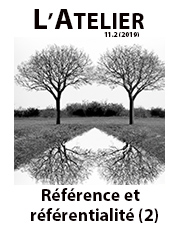Les Apories de la référentialité dans Orlando: A Biography de Virginia Woolf
Abstract
Orlando: A Biography was published in 1928, in the midst of intense debates regarding the referentiality of painting and photography. As such, it remains Virginia Woolf's most elaborate exploration of the ability of these different types of languages to represent life. In this mytho-poetic or fictional biography of Vita Sackville-West, she tried to capture the spirit of her friend in a text that is as heterogenous as the illustrations that were carefully chosen to accompany it. Woolf was both trying to revolutionise the genre of biography and to pay homage to her friend: the result is a mixture of parody and satire that undermines the photographer's, the painter's and the biographer's claims to veracity. Indeed the images (be they photographs of Vita or historical portraits of her ancestors) very rarely match their legends just as they very rarely bring any light upon the text they most often fail to “illustrate”. Woolf explores such notions as mimesis and invention, creativity and duplication only to show the fundamental instability of signs. Woolf challenges the reader's assumptions about representation in a bold, inventive text that is only superficially light: deep down she tries to educate our eyes and our minds to read and decipher signs beyond their obvious meaning. Her modernist text teaches us that vacillating between the feminine and the masculine and between different arts (as her heroine does) may well be the only means to fully grasp her text and the world around us.
Published
Issue
Section
License
- Work submitted for publication must be original, previously unpublished, and not under consideration for publication elsewhere. If previously published figures, tables, or parts of text are to be included, the copyright-holder's permission must have been obtained prior to submission.
- Authors of accepted manuscripts will assign to L'Atelier the right to electronically distribute their article, or publish it in any form (Internet, CD ROM, printed copy) but authors will retain copyright and, after the article has appeared in L'Atelier, authors may republish their text (in print and/or electronic form) as long as they clearly acknowledge L'Atelier as the original publisher.


